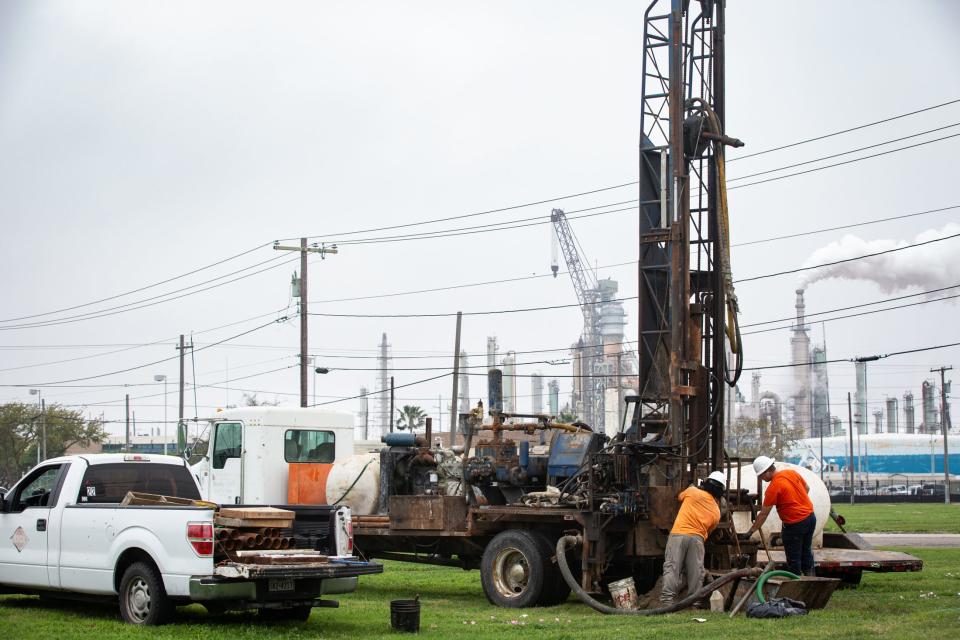A desalination plant permit goes to the public again this week. Here's when.
A key element in the city of Corpus Christi’s plans for desalination plant development will go before the public again Thursday in a scheduled meeting on the project’s draft discharge permit.
Heading into the Texas Commission on Environmental Quality’s event, local advocacy groups are making preparations for a rally outside the American Bank Center shortly before the 7 p.m. meeting gets underway – in a news release, the Coastal Action Network describing desalination as a “false solution that benefits polluters, not people.”
It’s among the points more hotly contended between opponents and supporters of the proposed project, which would in its initial phase have the capacity to generate as much as 30 million gallons of treated water per day.
Proponents have said increasing the city’s water supply is not exclusively intended to support industrial operations and is integral in supporting additional population and commercial growth.

The draft permit, if awarded to the city, would allow in the first phase of plant development discharging as much as an initial 34.3 million gallons of water treatment waste per day into the Inner Harbor Channel.
The plant’s proposed site would be located off the channel near W. Broadway Street and Nueces Bay Boulevard, and adjacent to the Hillcrest neighborhood.
Potential environmental impacts have been heavily debated, with opponents and proponents citing different – and sometimes conflicting – studies questioning, and alternatively asserting, whether the proposed plant could be managed in a way that would protect local ecology.
In its meeting notice, state regulators wrote that the draft permit meets “all statutory and regulatory requirements,” and that it has been “determined that no significant degradation of water quality is expected in Corpus Christi Inner Harbor.”
Several opponents have suggested decisionmakers expend funds on addressing the city’s existing, crumbling infrastructure, describing desalination in the Coastal Action Network news release as a “false narrative that desalination will provide water to a drought prone region.”
“The so-called ‘Inner Harbor’ planned desalination facility will not provide water to the residents of the City of Corpus Christi, but instead will lure more polluting, heavy water users to our region,” wrote For the Greater Good Co-Founder Isabel Araiza in the email.
Funding for the project continues to move forward as city representatives seek a low-interest loan from the Texas Water Development Board.
State officials last week ranked Corpus Christi’s Inner Harbor desalination plant proposal as the second-highest priority for funding based on the first competitive round of applications submitted from around the state.
Agency records show in the lead Greenville’s proposed water treatment plant expansion, which would be eligible for an $85 million low-interest loan.
Corpus Christi is listed as eligible for the same amount that had been requested, $535 million.
The board in the same meeting gave the green light for as much as about $3 billion in funding be set aside for the prioritization cycle, wrote Texas Water Development Board spokeswoman Emma Rogers in an email to the Caller-Times.
Next steps in the process require city officials to submit a full application next month.
The city previously accepted a $220 million low-interest loan from the agency’s programs – a figure that had been based on 2019 estimates for construction of a plant capability of generating 20 million gallons of treated water per day.
Since then, city officials have bumped up the proposed plant’s capacity to 30 million gallons of water per day.
It is now estimated that total project cost would be about $757.5 million – a sum of plant construction at $541.5 million and previously unidentified infrastructure costs at $211 million.
The increase accounts for inflation, expanded capacity and the addition of ancillary infrastructure.
City Councilman Roland Barrera is among the public figures anticipated to attend TCEQ’s meeting.
The city needs the additional water, he said, adding that he was hopeful TCEQ would see the city had performed its research.
“Obviously there (are) a lot of passionate individuals (who) make decisions based on emotions,” Barrera said. “But we just need to be able to absorb all the facts.”
In addition to a discharge permit, plant operations would require a water rights permit. The city was awarded a water rights permit in October 2022.
The city has been under Stage 2 drought restrictions since March 12, and previously under Stage 1 restrictions since June 2022.
Stage 2 drought is defined as the city’s combined levels of Lake Corpus Christi and the Choke Canyon Reservoir measuring below 30%. City data showed those levels standing at about 28.5%.
Public meeting and comment details, as shown in the notice:
When: 7 p.m. April 18
Where: American Bank Convention Center, 1901 N. Shoreline Blvd.
More: Here's how building a desalination plant may impact water rates in Corpus Christi
More: Here are the rules for Stage 2 drought restrictions – and why they are in effect.
This article originally appeared on Corpus Christi Caller Times: Corpus Christi desalination permit expected to bring packed house


